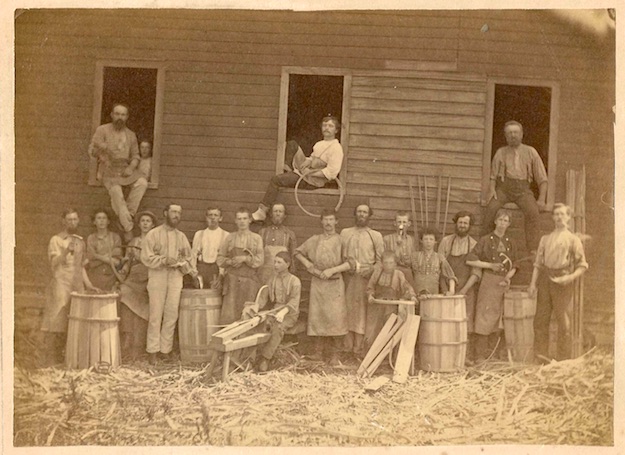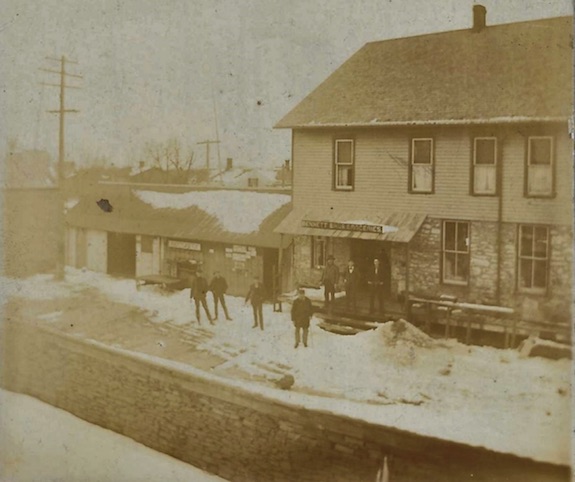Illuminating Orleans: William Bennett of Eagle Harbor endured many hardships before triumphs

This cooper shop at Eagle Harbor was located on the south side of the Erie Canal, by the bridge. The boy in the window to the left is identified as Charles Bennett. The photograph, which dates to the 1880’s, was donated to the Orleans County Dept. of History in 1962 by Mrs. Lottie Fountain Trow.
By Catherine Cooper, Orleans County Historian
Illuminating Orleans – Vol. 1, No. 26

Several fellow passengers were bound for Eagle Harbor, New York, having relatives who had settled there. William decided to go there also, expecting that being a harbor, it would be a place of importance for shipping and therefore for employment.
By the time they got to Eagle Harbor, they had spent their money and had bartered what few fine items they had for food and tickets. William spent their last eleven cents on food – bread, an onion, salt. He met a “former chum,” a shoemaker named Abbott, who took them to his home.
William got a job at a stone quarry, where he worked fourteen days for $1 a day. But, on arriving at the quarry on the fifteenth day, he was told that the owner had “failed in business.” William located the buyer of the stone and negotiated some payment from him. He then found a job haying and harvesting for a Joel Starkweather for one month for $13. He tried working as a Canal Driver ($14 per month) but did not like it. He then took a job chopping stove wood for 31 ¼ cents per cord. With his hands badly blistered, he “began to think of old England and the work I had left there, but I was here to make the best of it.”
Indeed, life in “old England” had been equally precarious. His father was a laborer who “indulged freely in beer drinking” and often was unemployed. At one point, when William was 10, the family resorted to the County Alms House, where he worked at the brick yard. His first job was at a limestone quarry (22 cents a day). He also worked as an apple picker and later learned the trade of wool combing, but soon the wool combers went on strike, and he was unemployed. He experienced the Bread Riots of 1847, when large crowds protesting the high price of grain stormed gristmills and farmhouses to demand relief. It was this background of social unrest, high prices and uncertain employment that caused him to decide to emigrate, even though his wife’s family objected strongly to her leaving.
Making the best of it in Eagle Harbor, William packed flour for C.A. Danolds, worked as a laborer on the 1854 enlarging of the Canal, learned how to mill and learned the cooper trade. In the spring of 1857, he was hired as a miller at $300 a year. His brothers, James and Charles, immigrated in 1854, and later brother George, his parents and sister.
Nancy, his “good wife …who was of cheerful disposition, with no tendency to fault-finding,” bore nine children, the youngest in 1875 when she was 44. That same year, five of the children were stricken at the same time with scarlet fever but they survived. Five of their children contracted measles in 1880, all survived, except for their daughter Mary.

Bennett Bros. store, Eagle Harbor, circa 1900
Despite several setbacks in employment and the economy, William gained a foothold and slowly prospered, by dint of hard work and shrewdness. In summarizing the years, he tends to elaborate on the negatives while sparing the details of their successes: “The year closed with many difficulties and some triumphs.”
He became a citizen. Following the death of his mother, he “quit all vices” and joined the Wesleyan Methodist Church. In 1880, he was elected Overseer of the Poor for the western half of the town of Gaines. When Harrison was inaugurated President in 1889, “a change in Postmaster was a natural outcome,” the position then being tied to political patronage, and William secured the appointment but had to relinquish it with the inauguration of Grover Cleveland in 1893.
A disastrous fire in Sept. 1893 destroyed several buildings in Eagle Harbor, including the A.S. Reed store. William’s sons, G.W. and James T., bought the site and built a new store which became a successful grocery business. The building still stands, north of the canal, right by the bridge.
William H. Bennett recounted the story of his life and times in 1911, at the age of 79. These memoirs, which are part of the Orleans County Dept. of History collection, are remarkable for the wealth of detail included about the economy, work, and survival during hard times in England, as well as in this country.
His memoirs are a gift to any family members interested in genealogy as he lists the birth dates of his children, their marriage dates, and the names of their spouses. Also, in the very first paragraph, he traces the Bennett family back three hundred years, residents of the City of Exeter, Parish Clerks of Saint Mary’s Episcopal Church, and all were named George Bennett.
This shrewd, industrious gentleman died at the age of 89 on July 22, 1921. He is buried in Otter Creek Cemetery.


























































